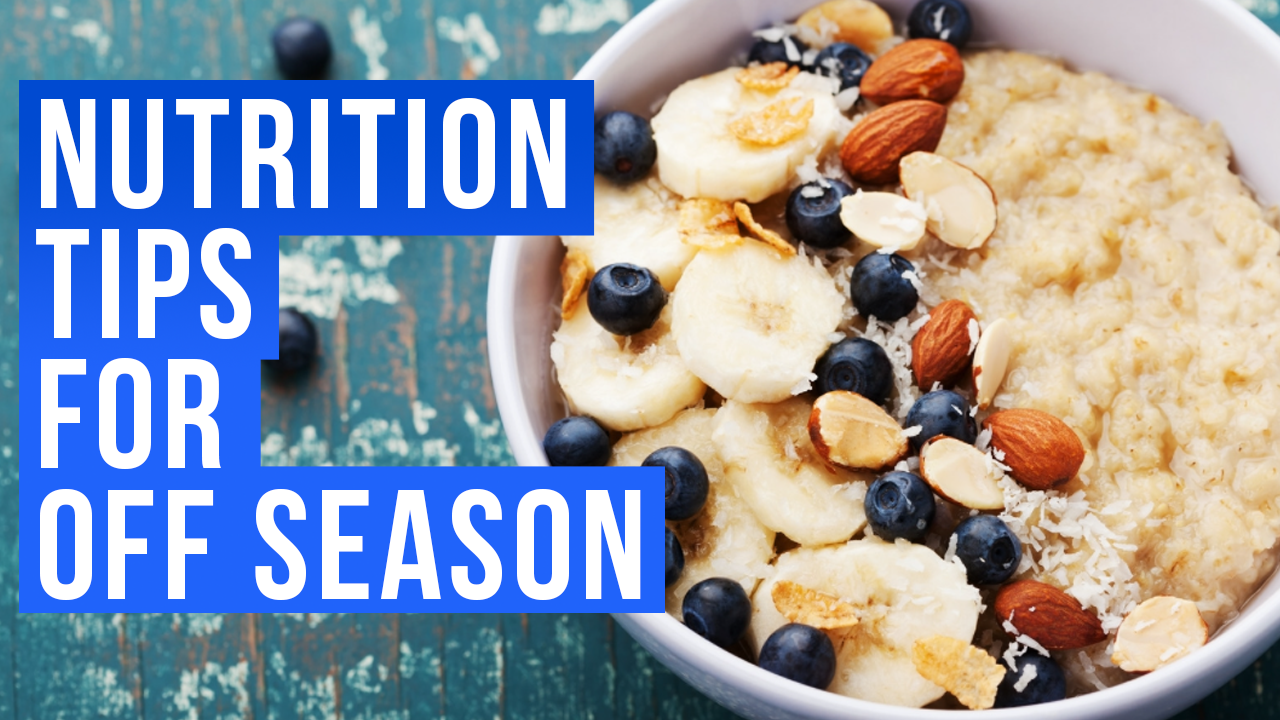Off Season Nutrition Tips For Triathletes
Ahhhh off season
A time to change things up a bit. Maybe put some specific focus on one discipline, perhaps try another sport or maybe even spend some time with your family and friends…
Maybe.
But anyway, off season can be a great time of year for triathletes, although managing your nutrition is not always easy. Do you eat more, less, change what you're eating completely?
Handy tips to improve your nutrition
Let’s run through 8 handy tips for you over the winter months
Ditch the drastic changes
This one might seem a bit basic but actually it's a really important starting point. You don't have to throw your nutrition habits out of the window - well unless they're really naff ones, and we're gonna cover that - but just because you're in this fabled off season doesn't mean things have to change.
The aim for nutrition is almost always slow, steady changes which are sustainable and that's gonna be a key focus for this video.
Consider your calorie intake
Calorie intake is one of those elephants in the room which can be a sensitive subject, but it's important to highlight.
As you go into the offseason consider how much you're eating against your past versus current training load. Now you don't even have to count calories here, you can do this intuitively.
Has your intensity or overall volume of training changed considerably? Well, consider matching that by reducing your food intake down a bit.
Remember the previous point here about doing things gradually - you could just have a slightly smaller snack or a slightly smaller meal and that could be all that you need to do
Create a nutrition goal
Setting a nutrition goal can be an incredibly helpful thing for triathletes in the off season. Having something to work towards gives that extra bit of motivation, and the off season is the perfect time to make some positive changes to your diet, and the type of things we're thinking about here are:
Some extra fruit or vegetables
Reduced reliance on packaged food
Having a proper breakfast
Wholegrain carbohydrates like brown rice or bread
The list here is almost endless, but I want you to think about your diet and come up with something to change.
Actively think about festive periods
Now regardless of whether you're the Grinch or you absolutely love Christmas or similar holidays, they're coming around and you're gonna be part of them!
My opinion is that you shouldn't restrict yourself from any foods at Christmas or similar holiday. It's meant to be a period to enjoy with your friends and family.
But it's important to be mindful about your food. Want to eat some chocolate, or drink some gluweinn?
Well, do it, and enjoy it the heck out of it! But just be aware you can't just eat everything and there does have to be some moderation. So, try to enjoy sensible portions, really savour that deliciousness, and then be smug and happy about it when you do.
Prioritise that thing you keep putting off
Although we do love it, remember it isn't always about triathlon or performance. And actually, if you do prioritise other things you might find your overall performance gets better anyway.
Do you have something which during race season you always go 'ah, I'll get better at this once the race season is outta the way' - but actually, come off-season, you just keep on going with that same old habit!
Well, the off-season is the perfect time to focus on some things which maybe you sometimes skimp on - and sleep is a pretty good example. Take a step back from the hard training and build some new good habits to take into race season.
Food first approach
Off-season is also an awesome time to focus on whole foods, and again trying to build this into a habit.
By food first I mean consider what parts of your diet are either processed or pre-packaged foods. Things here might be protein bars or supplements, packet rice, shop bought sugary granola.
Try to experiment a bit with your food and see what you can come up with. You could try to create some of those things you buy which would be much healthier if you just made yourself.
Now I have 2 pretty fond memories on this point - the first was when I tried to make homemade protein bars. They were pretty bad. I can't remember what recipe I followed but they sucked. Tasted like cardboard and sand. Not very tasty. But it was fun!
The other was when I whipped up some homemade granola. It was delicious, hearty, heathy and pretty easy to do.
My top tip here though is once you've made granola put it in a cupboard out of sight... Because it's a little bit too easy to just eat it every time you're in the kitchen.
Mmmmm. Sweet, tasty granola
Reduce your simple sugars
This ties in with the second point which was to consider your overall calorie intake. Chances are you aren't doing as much training, whether that's intensity or volume, so your overall nutritional needs aren't going to be the same.
This is a good time to reduce the amount of simple sugars you're consuming. So try to reduce the amount of gels, sports bars or carb drinks that you use, or other quick 'pick me ups'
Vitamin D
It’s not always possible if you live in a place like the sunny (or not) United Kingdom, but try to keep getting some natural light! Not only is that good for our mental health but it's important to keep our Vitamin D levels up. If that's harder for you, so for example if you spend a lot of your days in an office without natural light or you have darker skin then consider taking a vitamin D supplement.
Vitamin D deficiency is a pretty common problem that I see in my work in general practice and it's one of the few supplements that I think it's very reasonable to use. If you're an athlete who competes at a high level and may be drugs tested then I'd always suggest using a supplement that has been tested by a testing program like informed sport, and I've put a link to a video at the top of the screen with a bit more info on that in case you're interested.
Hopefully these tips give you some things to work on during your off season. Enjoy your training and enjoy creating some healthy habits!



